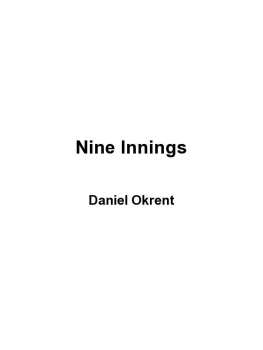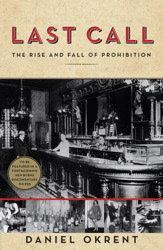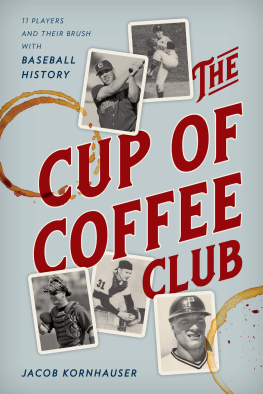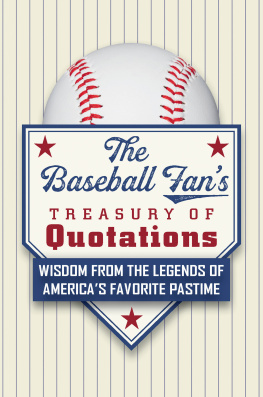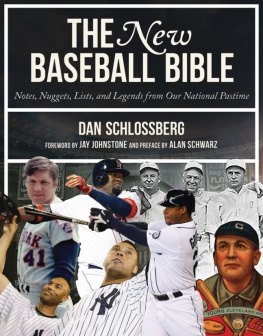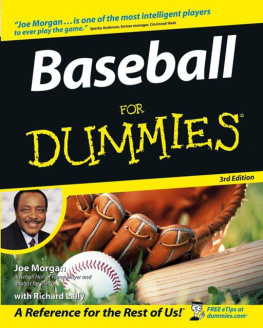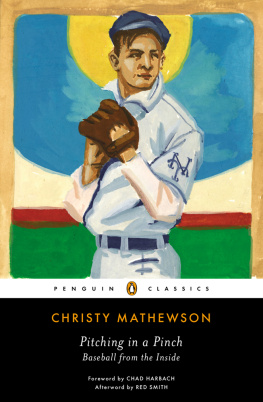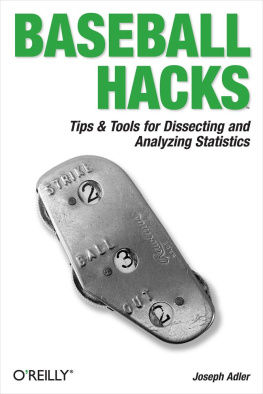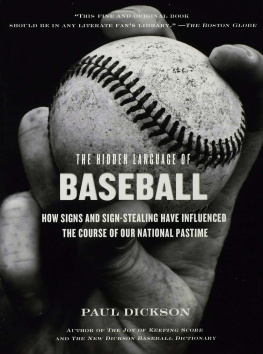Afterword copyright 2000 by Daniel Okrent
Foreword copyright 1994 by Wilfrid Sheed
Copyright 1985 by Daniel Okrent
All rights reserved
For information about permission to reproduce selections
from this book, write to Permissions, Houghton Mifflin Company,
215 Park Avenue South, New York, New York 10003.
Library of Congress Cataloging-in-Publication Data
Okrent, Daniel.
Nine innings
Includes index
1 Baseball I Title
GV 867.057 1985 796.357'2 84-26687
ISBN 0-89919-334-X
ISBN 0-618-05669-6 (pbk)
Printed in the United States of America
EB 10 9 8 7 6
Portions of Chapters 3 and 7 originally appeared,
in somewhat different form, in Inside Sports magazine.
For Harry Okrent and John Lazear Okrent,
and in memory of John Cushman
This ballthis symbol; is it worth a man's life?
Branch Rickey
Acknowledgments
Work on this book began in 1980, when I first traveled to Milwaukee to discuss my plans with Bud Selig, the president of the Milwaukee Brewers, and Harry Dalton, his executive vice president and general manager. My intention was to write about a game in the 1981 season, and to spend the months leading up to that game reporting on the events, people, and issues which would likely have a bearing on it. But 1981 was riven by an unprecedented midseason strike by members of the Major League Baseball Players Association, and on the advice of my publishers I postponed until 1982 the selection of a game that would serve as the book's focus while continuing to gather the material that would constitute the digressions from my narrative. So much of baseball's shape is digressive that this turned out to be a fortunate delay.
Over the course of two years of research, during which the Brewers played under the leadership of three different managers, I received the patient help of many people in the Milwaukee organization. Among these, I wish to thank Bud Selig; Harry Dalton; Tom Skibosh, the Brewers' publicity director; managers George Bamberger, Harvey Kuenn, and, especially, Bob Rodgers; and Tommy Ferguson, who served as Milwaukee's unflappable, generous, and superbly helpful traveling secretary until early 1983.
Tom Flaherty of the Milwaukee Journal and Vic Feuerherd of the Milwaukee Sentinel were my companions on road trips, colleagues in the press box, and ever-helpful advisers. This book will probably be less interesting to Tom and Vic than to anyone else, for they live with, think about, and write daily about most of the matters addressed here. If the book is interesting to others, Tom and Vic deserve much of the credit, and absolutely none of the blame if it is not.
Longer-standing debts of gratitude must be paid to Bob Fishel of the American League office, Joe Durso of the New York Times, and Jerome Holtzman of the Chicago Tribune, all of whomentirely unwittinglyplayed roles in getting me involved in baseball writing in the first place. Bob Creamer and Steve Wulf of Sports Illustrated, and John Walsh of Inside Sports, provided professional support and encouragement; John, not incidentally, also provided the magazine assignments (and the much-appreciated expense money) that paid for my attendance at the baseball winter meetings in Dallas and in Hollywood, Florida, and at the Brewers' spring training in Sun City, Arizona. Several people in baseball who asked that they not be mentioned in the book were even more generous than they were self-effacing (or, in a handful of cases, justifiably fearful of the reproach of others).
I also owe deep thanks to Liz Darhansoff, who was endlessly supportive; to Michael Stevens, who made me welcome in Milwaukee; to Tony Lake, who offered a valuable set of fan's notes; to Bill James, who will immediately recognize in my work the influence of his thinking, even if not the clarity of his prose; and to all the Rotissarians, but especially among them Lee Eisenberg, who pushed me, and the tall tactician, Cork Smith. Friend, confidant, confessor, drill sergeant, editor, Cork would make a great manager.
Virtually as common as acknowledgments in which the writer thanks his wife are acknowledgments in which the writer first points out how common it is for writers to thank their wives. Thus may I appear to be unoriginal. In fact, though, no one else is married to Becky, and no one else could ever know how extraordinarily fortunate I am.
D.O.
Worthington, Massachusetts
Foreword
The midseason baseball game must be the closest thing in sports to a grain of sand or a single hair on your head: which is to say, it's easy to lose sight of and forget forever, but if properly studied can tell you almost all you need to know about the rest of the beach, and about beaches in general. And while you're studying it, it is the center of the universe, the basic unit, all the baseball there is today, and writers take their eye off it at their peril.
So what have we today? As the usher dusts off your seat and holds out his palm (or is that just in New York?), the possibilities are virtually infinite. You may be about to see the start of a monster winning or losing streak, or the end of same; the game in which soandso finds himself on the mound, or the one where suchandsuch loses himself forever at the plate; the game the winning team remembers in Octoberthe Big One, the turning pointand the losing pitcher for longer than that. ("If they'd taken out Joe Paddlefoot in the eighth for defensive purposes, the way they usually did, and cut the damn infield grasstwenty games and not another lousy nineteen." "Yes, Mr. Sutton. We know.") Or it could be that singular baseball anomaly, the game that not one of the players busting a gut out there ever remembers again.
Whatever it is, it is undoubtedly Heaven, a chunk of immortality, with a new summer and a new season stretching forever in all directions. But perhaps the perfect reader for this particular book might be the pagan who doesn't know this yet, who thinks Heaven sounds kind of dull with nothing much going on up there. The best answer to this is obviously to place him in back of the eyes and inside the fevered brain of a true-blue baseball fan for a couple of hours and see if he can stand the excitement.
Although I guess there's no point pretending I actually chose this particular author for our experimentor even that I'd thought of the experiment before I read his bookit's unimpeachably true that I couldn't have picked a better one or a fannier fan than the chap you're about to read. By day, Dan Okrent could pass for a perfectly normal, well-rounded citizen, editing, as I write this, a well-rounded magazine called Life and talking for minutes on end about subjects other than baseball. But at the sight or sound of the magic word, strange things happen to Okrent: the eyes gleam, the tongue wags, and wheels start to spin in little-known parts of the cortex. At least, I'm pretty sure that's what's happening, because I'm frequently experiencing the same symptoms myself, and I notice that the waiters are giving us a special wide berth today.
In the odd way in which such brains work, it may actually add something to the intensity in there that the game under investigation takes place in June rather than September. At this point the fan has barely begun to unpack from wintera whole season will barely be long enough for the whole joband is still beside himself over having real games to work with and brood about instead of encyclopedias and suspect memoirs. For months now he's been gorging on numbers, his natural food, eked out by stories, tendencies, and psychological profiles, and now at last he has something to use them on. He is ready to play.
Where to begin? As the first batter steps to the plate, he lets loose a hundred conjectures, starting perhaps with What is
Next page
